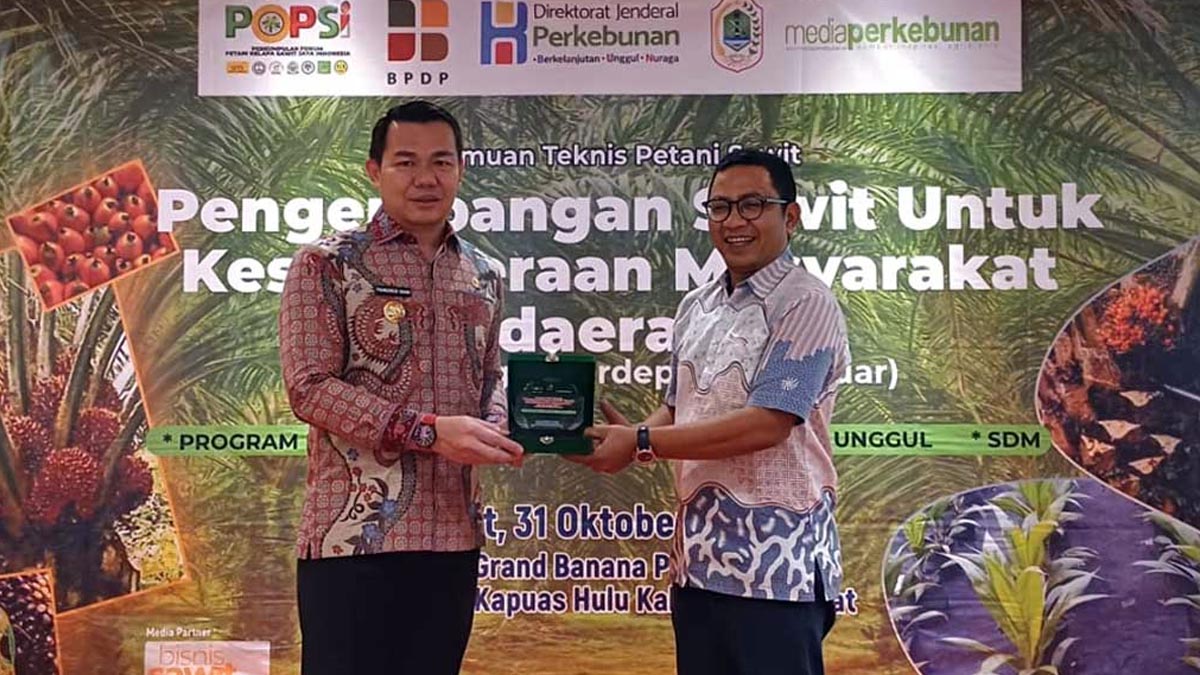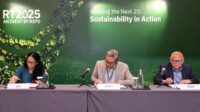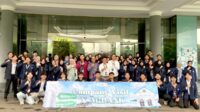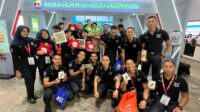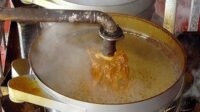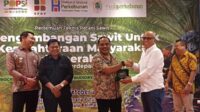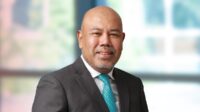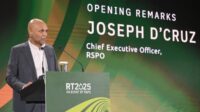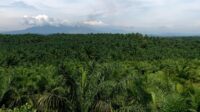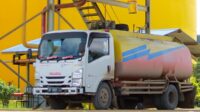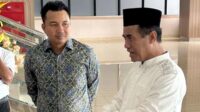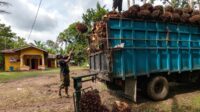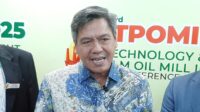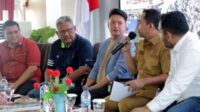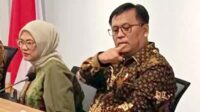PALMOILMAGAZINE, PUTUSSIBAU — Efforts to improve the welfare of oil palm farmers in Indonesia’s frontier, outermost, and disadvantaged (3T) regions continue to gain momentum. Supported by the Plantation Fund Management Agency (BPDP), the Indonesian Palm Oil Farmers Association (POPSI), in collaboration with Media Perkebunan, held a technical training session for smallholders under the theme “Palm Oil Development for Community Welfare in 3T Regions.” The event took place at the Grand Banana Hotel, Putussibau, Kapuas Hulu Regency, West Kalimantan, on Friday (October 31).
The initiative received an enthusiastic response, with more than 150 participants—including independent smallholders, village heads, cooperative leaders, extension officers, and community figures—filling the training hall. Their strong turnout reflected the determination of Kapuas Hulu residents to make palm oil the backbone of their regional economy.
POPSI Secretary General and Media Perkebunan Chief Editor, Hendra J. Purba, expressed gratitude for the support of all parties, particularly the Kapuas Hulu Regency Government and Regional House of Representatives (DPRD).
Also Read:
“The enthusiasm was extraordinary. Despite limited preparation time, this program came together thanks to the support of the DPRD Chair and the Regent. We set a cap of 150 participants due to venue limits—many more wanted to join,” Hendra said in an official statement to beige-heron-208544.hostingersite.com (October 31, 2026).
Hendra emphasized the importance of using certified and legal planting materials to prevent losses from fake seeds still circulating in some areas.
“There are 21 officially registered oil palm seed producers in Indonesia. Farmers must avoid cheap, uncertified seeds—those carry high risks of crop failure and long-term loss,” he cautioned.
Meanwhile, POPSI Chairman Mansuetus Darto highlighted Kapuas Hulu’s vast potential for palm oil expansion, alongside infrastructure and technological challenges.
“This region has extensive land and highly motivated communities. But limited access to roads, markets, and technology remains a key barrier. Sustainable palm oil offers a middle path between economic growth and environmental protection,” he explained.
Also Read:
- RSPO Strengthens Governance with New Executive Committee to Boost Global Efficiency and Farmer Support
- RSPO CEO Calls for Stronger Global Support: Smallholders Have Proven Their Commitment to Sustainability
Darto reaffirmed POPSI’s commitment to positioning smallholders as key actors within the palm oil value chain rather than passive price-takers. This will be achieved through technical training, strengthening transparent cooperatives, and supporting sustainability certification such as ISPO.
“We want farmers to be part of a value-added production chain. That’s only possible with strong, transparent cooperatives,” he added.
Support also came from Kapuas Hulu DPRD Chair, Yanto, S.P., who said the training provided a crucial opportunity to improve smallholders’ capacity.
“Most smallholders here still lack knowledge about selecting superior seeds, applying proper agronomic practices, and accessing BPDP programs such as replanting (PSR), infrastructure, and human resource development. We fully support continued activities like this,” Yanto said.
He noted that smallholder plantations in Kapuas Hulu remain underdeveloped and not yet optimized to drive local economic growth.
“Strategic steps are needed so farmers aren’t left behind. The DPRD is committed to ensuring policies that truly favor the people,” he affirmed.
Officially opening the event, Kapuas Hulu Regent Fransiskus Diaan, S.H., M.H., described palm oil as a vital sector for both local and national economies—while stressing the need for balance between economic advancement and environmental preservation.
“Kapuas Hulu covers 31,328 square kilometers, with 56% designated as protected and conservation forests. Only about 20% of the land is suitable for agriculture and plantations,” he explained.
He also warned residents against buying illegal seeds widely sold on the market.
“Use labeled, certified planting materials. They may cost a bit more, but the results are far better and more profitable in the long run,” the Regent advised.
Fransiskus reaffirmed the regional government’s commitment to collaborate with farmers, cooperatives, companies, and institutions such as BPDP and POPSI to build a productive, competitive, and sustainable palm oil sector.
“We want palm oil in Kapuas Hulu to generate economic value, social benefits, and environmental integrity. Let’s cultivate palm oil wisely—turning it into a true source of prosperity and a guardian of nature,” he concluded. (P2)

